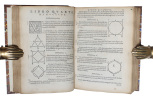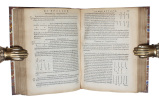1 books for « euclid euklid of ale... »Edit
Euclide Megarense Philosopho, solo Introduttore delle Scientie Mathematice. Diligentementee Rassettato, et alla integrità ridotto, per il degno professore di tal Scientie Nicolo Tartalea Brisciano (Nicolo Tartaglia). Secondo le due Tradottioni. Con un...
Venetia, Curtio Trojano, 1565. 4to. Bound in a very nice recent hcalf in old style. Raised bands and richly gilt back. 315,(1) leaves (=632 pp). Profusely illustrated with gemetrical diagramss in the text. Printers woodcut-device at end. Small part of lower right corner of title gone, no loss of text. Light browning to first and last leaf. 6 last leaves with a faint dampstain. Very light browning to outher margins. Otherwise a fine clean copy.
Scarce second edition of Tartaglia's very influential translation of all Euclid's 15 Books, as this Italian translation of Euclid was the first translation at all into the vernacular. The translation by Tartaglia was first published 1543 and was founded on the latin edition of Campanus and Zambetti.Niccolo Fontana of Brescia has a great name in the history of mathematics. A cut in the face from a French soldier caused him to stammer and as a consequence of this he was called 'Tartaglia'. He is famous for his solution of third-degree equations which occasioned a long polemic with Cardano about priority. He is also known for ""Tartaglia's Triangle"", later known as ""Pascal's Triangle"", and he is well-known for his Archimedes-edition of 1543 and 1551 with his commentaries.""The most famous source of Greek geometry is the monumental work of Euclid of Alexandria, called the ""Elements"" (around 300 B.C.). No other book of science had a comparable influence on the intellectual development of mankind. It was a treatise of geometry in thirteen books which included all the fundamental results of scientific geometry up to his time. Euclid did not claim for himself any particular discovery, he was merely a compiler. Yet, in view of the systematic arrangement of the subject matter and the exact logical procedure followed, we cannot doubt that he himself provided a large body of specific formulations and specific auxiliary theorems in his deductions. It is no longer possible to pass judgement on the authorship of much of this material"" his book was meant as a textbook of geometry which paid attention to the material, while questions of priority did not enter the discussion."" (Cornelius Lanzos in ""Space through the Ages"").Max Steck III:72 - Thomas-Stanford: 39 - Riccardi Euclideana V:1 - Adams E:993. - Brunet II:1090.
 Write to the booksellers
Write to the booksellers




